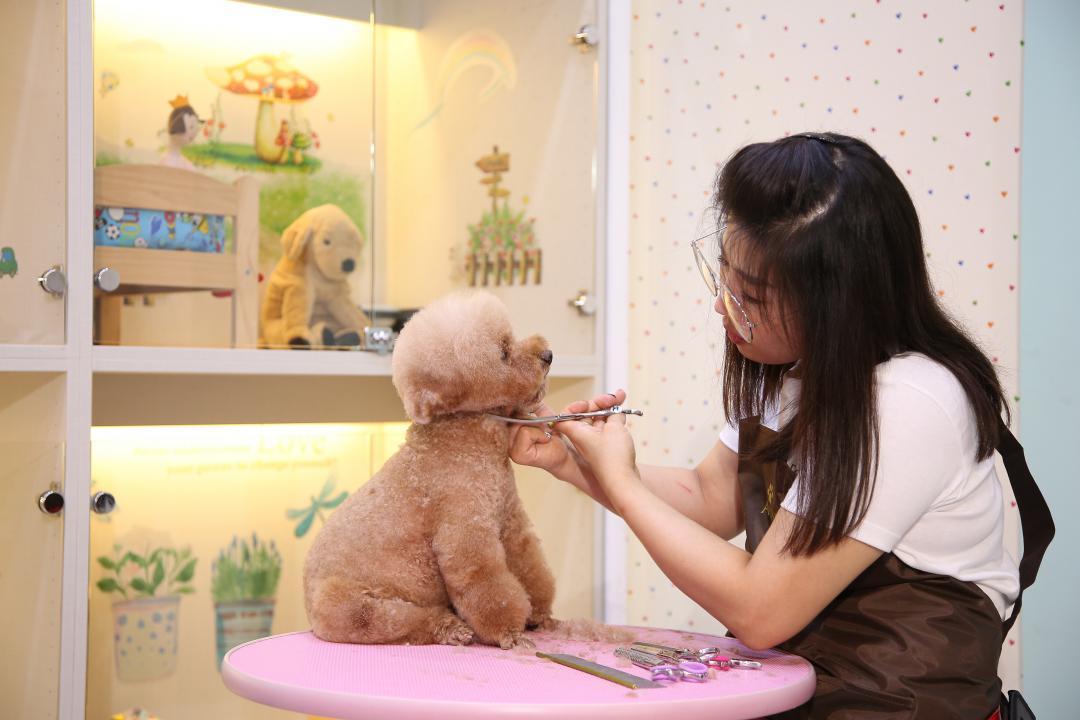The Consumer Protection Committee today released standard regulations for pet grooming services, stipulating that businesses should clearly explain pricing methods, ask if pets are aggressive and charge an additional fee if pets are left at the shop for an extended period.
With a growing proportion of households adopting pets, more businesses are offering pet grooming services from nail trimming to bathing.
The committee in a news release today announced its new “Standard Contracts for Dog and Cat Grooming Services,” with the Ministry of Agriculture responsible for enforcement.

Photo: Taipei Times
Committee deputy director Chen Hsing-hung (陳星宏) said that the regulations are intended to prevent disputes between consumers and businesses, and balance both parties’ rights.
There were 17 disputes over pet grooming last year, most commonly over unclear pricing, with pet owners asked to pay extra fees before being able to retrieve their pets, Chen said.
The new regulations would be binding to both parties, preventing similar disputes, he said.
Other disputes have arisen because owners failed to pick up their pets on time, inconveniencing the business by leaving pets in their care, Chen said.
The regulations stipulate that businesses may charge late pickup fees and additional care fees if the pet is not picked up by the end of the business day, he said.
The additional daily fee cannot exceed more than three times the original service fee, he added.
The regulations also stipulate contract termination and refund policies, Chen said.
If the service provider is at fault, it must refund the customer within three days, Chen said.
If the service cannot be completed due to unavoidable disasters, any fees already collected must be refunded, he said.
In addition, if the consumer has prepaid for services, but decides not to continue, they may terminate the contract, Chen said.
A processing fee may be charged in such cases, not exceeding NT$1,000 or 5 percent of the total contract amount, he said.
If businesses use a standardized contract, but contravene the provisions, they may be fined NT$30,000 to NT$300,000 if they fail to correct the issue within the given deadline, the committee said.
If they fail to do so again upon a second warning, they may be fined NT$50,000 to NT$500,000, with additional penalties for each subsequent contravention, it said.

The manufacture of the remaining 28 M1A2T Abrams tanks Taiwan purchased from the US has recently been completed, and they are expected to be delivered within the next one to two months, a source said yesterday. The Ministry of National Defense is arranging cargo ships to transport the tanks to Taiwan as soon as possible, said the source, who is familiar with the matter. The estimated arrival time ranges from late this month to early next month, the source said. The 28 Abrams tanks make up the third and final batch of a total of 108 tanks, valued at about NT$40.5 billion

Two Taiwanese prosecutors were questioned by Chinese security personnel at their hotel during a trip to China’s Henan Province this month, the Mainland Affairs Council (MAC) said yesterday. The officers had personal information on the prosecutors, including “when they were assigned to their posts, their work locations and job titles,” MAC Deputy Minister and spokesman Liang Wen-chieh (梁文傑) said. On top of asking about their agencies and positions, the officers also questioned the prosecutors about the Cross-Strait Joint Crime-Fighting and Judicial Mutual Assistance Agreement, a pact that serves as the framework for Taiwan-China cooperation on combating crime and providing judicial assistance, Liang

A group from the Taiwanese Designers in Australia association yesterday represented Taiwan at the Midsumma Pride March in Melbourne. The march, held in the St. Kilda suburb, is the city’s largest LGBTQIA+ parade and the flagship event of the annual Midsumma Festival. It attracted more than 45,000 spectators who supported the 400 groups and 10,000 marchers that participated this year, the association said. Taiwanese Designers said they organized a team to march for Taiwan this year, joining politicians, government agencies, professionals and community organizations in showing support for LGBTQIA+ people and diverse communities. As the first country in Asia to legalize same-sex

MOTIVES QUESTIONED The PLA considers Xi’s policies toward Taiwan to be driven by personal considerations rather than military assessment, the Epoch Times reports Chinese President Xi Jinping’s (習近平) latest purge of the Chinese People’s Liberation Army (PLA) leadership might have been prompted by the military’s opposition to plans of invading Taiwan, the Epoch Times said. The Chinese military opposes waging war against Taiwan by a large consensus, putting it at odds with Xi’s vision, the Falun Gong-affiliated daily said in a report on Thursday, citing anonymous sources with insight into the PLA’s inner workings. The opposition is not the opinion of a few generals, but a widely shared view among the PLA cadre, the Epoch Times cited them as saying. “Chinese forces know full well that